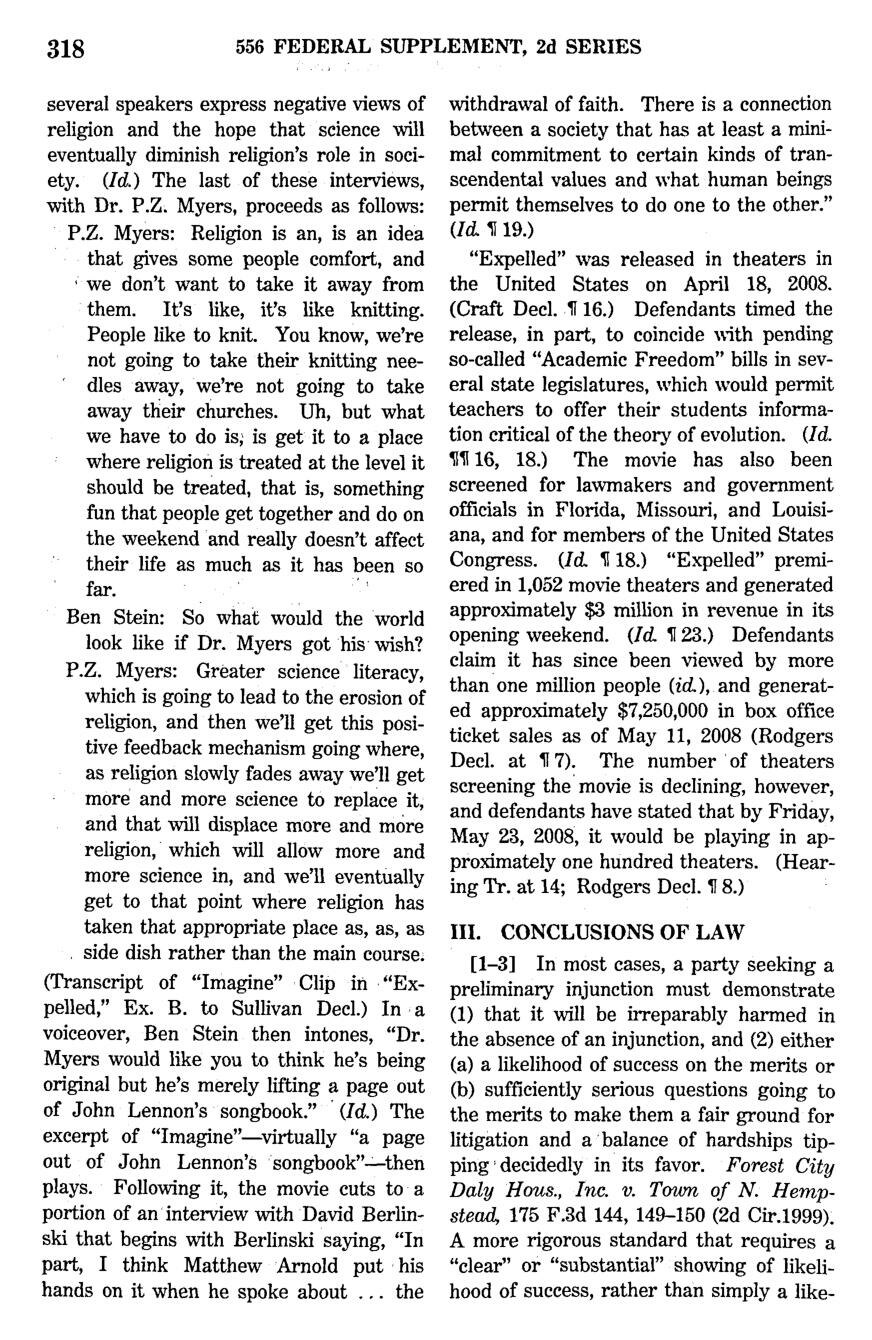several speakers express negative views of religion and the hope that science will eventually diminish religion’s role in society. (Id.) The last of these interviews, with Dr. P.Z. Myers, proceeds as follows:
P.Z. Myers: Religion is an, is an idea that gives some people comfort, and we don’t want to take it away from them. It’s like, it’s like knitting. People like to knit. You know, we’re not going to take their knitting needles away, we’re not going to take away their churches. Uh, but what we have to do is, is get it to a place where religion is treated at the level it should be treated, that is, something fun that people get together and do on the weekend and really doesn’t affect their life as much as it has been so far.
Ben Stein: So what would the world look like if Dr. Myers got his wish?
P.Z. Myers: Greater science literacy, which is going to lead to the erosion of religion, and then we’ll get this positive feedback mechanism going where, as religion slowly fades away we’ll get more and more science to replace it, and that will displace more and more religion, which will allow more and more science in, and we’ll eventually get to that point where religion has taken that appropriate place as, as, as side dish rather than the main course.
(Transcript of “Imagine” Clip in “Expelled,” Ex. B. to Sullivan Decl.) In a voiceover, Ben Stein then intones, “Dr. Myers would like you to think he’s being original but he’s merely lifting a page out of John Lennon’s songbook.” (Id.) The excerpt of “Imagine”—virtually “a page out of John Lennon’s songbook”—then plays. Following it, the movie cuts to a portion of an interview with David Berlinski that begins with Berlinski saying, “In part, I think Matthew Arnold put his hands on it when he spoke about . . . the withdrawal of faith. There is a connection between a society that has at least a minimal commitment to certain kinds of transcendental values and what human beings permit themselves to do one to the other.” (Id. ¶ 19.)
“Expelled” was released in theaters in the United States on April 18, 2008. (Craft Decl. ¶ 16.) Defendants timed the release, in part, to coincide with pending so-called “Academic Freedom” bills in several state legislatures, which would permit teachers to offer their students information critical of the theory of evolution. (Id. ¶¶ 16, 18.) The movie has also been screened for lawmakers and government officials in Florida, Missouri, and Louisiana, and for members of the United States Congress. (Id. ¶ 18.) “Expelled” premiered in 1,052 movie theaters and generated approximately $3 million in revenue in its opening weekend. (Id. ¶ 23.) Defendants claim it has since been viewed by more than one million people (id.), and generated approximately $7,250,000 in box office ticket sales as of May 11, 2008 (Rodgers Decl. at ¶ 7). The number of theaters screening the movie is declining, however, and defendants have stated that by Friday, May 23, 2008, it would be playing in approximately one hundred theaters. (Hearing Tr. at 14; Rodgers Decl. ¶ 8.)
III. CONCLUSIONS OF LAW
In most cases, a party seeking a preliminary injunction must demonstrate (1) that it will be irreparably harmed in the absence of an injunction, and (2) either (a) a likelihood of success on the merits or (b) sufficiently serious questions going to the merits to make them a fair ground for litigation and a balance of hardships tipping decidedly in its favor. Forest City Daly Hous., Inc. v. Town of N. Hempstead, 175 F.3d 144, 149-150 (2d Cir. 1999). A more rigorous standard that requires a “clear” or “substantial” showing of likelihood of success, rather than simply a like-
